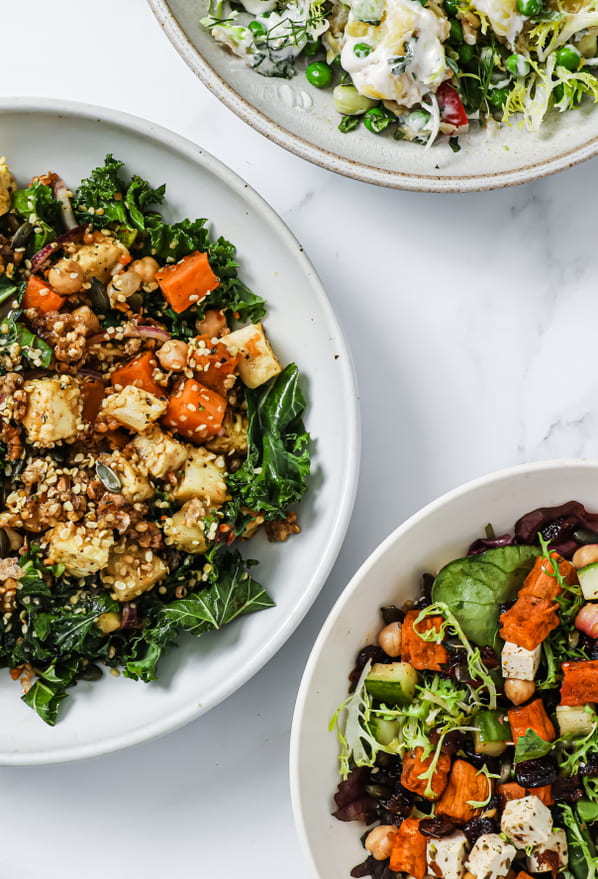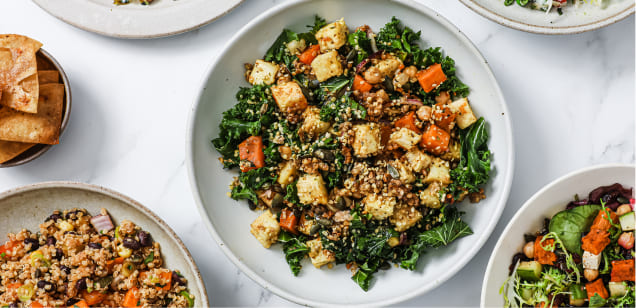Beginner’s guide to starting a plant-based diet
So, you’re thinking about switching to a plant-based diet, but don’t know where to start. Don’t fret! At Holy, we have you covered – we have the insight and expertise to help make your transition easy, seamless, and enjoyable.
What is a whole-food, plant-based diet?
Before we jump in, let’s be clear on what a whole-food, plant-based diet is. A whole-food, plant-based diet lets you meet your nutritional needs by focusing on natural, minimally processed plant foods such as fruits, vegetables, nuts, seeds and whole grains, and is based on the following principles:
- Whole foods are natural foods that are not heavily processed. That means whole, unrefined, or minimally refined ingredients.
- Plant-based means the food originates from plants and doesn’t include animal ingredients such as meat, milk, eggs, or honey.
Is a whole-food, plant-based diet the same as being vegan?
While there are clear similarities between eating a whole-food, plant-based diet and being vegan, there are some key differences to note too. Vegans avoid all animal products in their lifestyle - from food to clothing and shoes. While many do, not all vegans focus on whole plant foods, as they may also consume refined and processed foods. By comparison, a whole-food, plant-based diet is one that minimises all animal products and highly refined foods (including oil), instead focusing on eating mostly whole-foods from plant sources.
Common reasons for going plant-based
The starting point of all achievements is desire. There has to be a motivating reason as to why you want to switch to a plant-based diet in the first place. There are countless reasons why someone might want to adopt a plant-based diet, and each reason will vary person by person. But, aside from religious and cultural motivations, these factors can largely be split into three main broad areas – improving your health, reducing your impact on the environment, and to help protect people and animals. We are going to break down each of these reasons in a little more detail for you now.
- Health – One of the most impactful steps you can take today to improve your health, boost your energy levels, and prevent chronic diseases is to switch over to a plant-based diet. Nutrition is the cornerstone in reducing your risk of developing health problems and living longer. Many chronic diseases can in fact be prevented, controlled, or even reversed on a whole-foods, plant-based diet.
- Environment – Plant-based diets are proven to have considerably lower carbon, water, and ecological footprints in comparison to meat and fish-based diets. This is because plant-based food requires far less land and resources than meat and dairy, reducing deforestation and land degradation. In addition, a plant-based diet eradicates the need for overfishing – which is proven to cause an imbalance of biodiversity – therefore helping to replenish marine ecosystems.
- People & Animals – By choosing a plant-based diet, you’ll contribute enormously in helping to slow the destruction of our rainforests in order to clear land for raising cattle (or growing the crops to feed them). So, you’ll help to protect the habitats of indigenous people and animals like orangutans, pandas and birds who rely on these rich ecosystems to survive. And by reducing your carbon footprint with a plant-based diet, you’re helping fight climate change and the devastation that it inflicts on humans and animals around the world.
Will I still get all my vitamins and nutrients on a plant-based diet?
When we fill our plates with fruits and vegetables, legumes, nuts, seeds and wholegrains, we are nourishing our bodies with the natural tools they need to function at their best. Whole plant foods contain all the essential nutrients we need – with the only exception being vitamin B12 which is naturally present in foods of animal origin, including fish, meat, poultry, eggs, and dairy products. However, you can boost your intake of B12 from fortified foods such as plant-based milks and breakfast cereals, but the most effective source is to just use a simple B12 supplement.
Some final things to consider before embarking on your plant-based journey
We understand that changing a lifelong habit does not just happen at a click of the fingers. Switching to a plant-based diet requires education, patience, and time, but there are some important tips to consider as you embark on this new journey.
- Find a strategy that works for you. If you feel that quitting all non-plant-based food at once works for you, then go for it. But, if you need more time to adjust to a plant-based diet, just take it slowly by gradually removing non-plant-based foods from your diet. It does not have to be an all-or-nothing change to begin with. Make the changes you feel comfortable with, at your own pace.
- Educate yourself on a plant-based diet by watching documentaries, listening to podcasts, reading books, and networking with fellow vegans through events, social media, blogs, forums, and websites. You can learn so much from the vegan community, and it can help you to become a more informed consumer.
- Once you decide to go plant-based, start by giving away any existing meat and dairy products in your house. You could donate them to a local shelter or give them to friends and family. Once those products are out of sight, they are out of mind.
One of the most important things to bear in mind, though, is not to be too hard on yourself if you do slip up. Don’t put too much pressure on yourself by trying to be the ‘perfect’ vegan, or even by assigning yourself with labels for that matter. There are likely to be setbacks along the way, whether intentional or not, so keep thinking of the bigger picture and use any missteps as learning lessons.
And remember, there is no better time than NOW to make the change. You simply won’t know until you try. You’ve got this!
How can Holy help?
We make the switch easy by taking any guesswork out of your meal planning. Our nutritionists and chefs have carefully and precisely created a nutrient-dense vegan menu, packed full of all the vitamins and minerals you need to thrive. All the key nutrients many can be deficient in such as Vitamin D, B12, C, A, K, Omega 3, Iodine, Iron, Selenium and many others are delivered through high quality plant-based sources. Our customers experience benefits in their well-being in as short as 3 days after a Holy meal plan, feeling more energised, less bloated, and more focused and productive.



